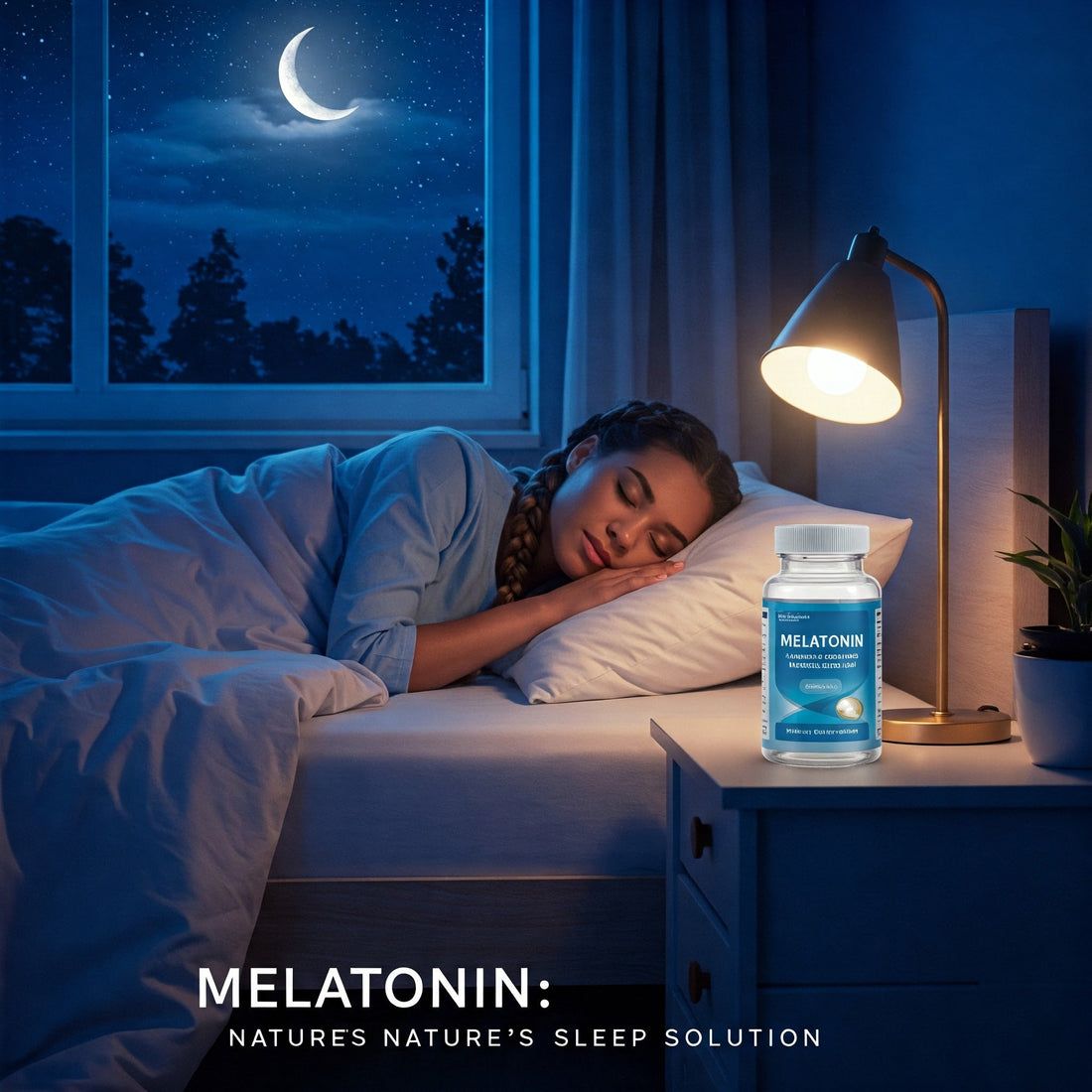
🌙 Melatonin Supplement: A Natural, Non-Addictive OTC Solution to Sleep Disorders
Share
In a world full of distractions, blue light, stress, and late-night scrolling, getting a good night's sleep has become more difficult than ever. For millions dealing with disrupted sleep patterns, melatonin supplements are emerging as a trusted, natural solution.
But what exactly is melatonin? Can it really help manage sleep disorders—and is it safe for long-term use? Most importantly, can you get it without a prescription?
Let’s dive into the science, benefits, and usage of melatonin supplements, and discover why they might just be the sleep support your body has been waiting for.
🌌 What Is Melatonin?
Melatonin is a hormone your brain produces in response to darkness. It helps regulate your body’s circadian rhythm—your internal 24-hour clock that tells you when to feel sleepy and when to wake up.
Under normal circumstances, your melatonin levels rise in the evening, peak at night, and drop in the morning. However, factors like artificial light exposure (especially from screens), travel across time zones, stress, or shift work can interfere with melatonin production—leading to poor sleep quality.
That’s where melatonin supplements come in handy.
✅ Melatonin Is Available Over the Counter (OTC)
Unlike prescription sleep medications, melatonin is an OTC product in many countries, including the United States. This means you can easily purchase it from:
-
Pharmacies
-
Health food stores
-
Online retailers
Because it’s classified as a dietary supplement, you don’t need a prescription to buy melatonin. This accessibility makes it a convenient option for people seeking a non-pharmaceutical, gentle approach to better sleep.
🛌 What Sleep Disorders Can Melatonin Help With?
Melatonin is widely researched and used to manage several types of sleep-related disorders and disruptions. Here's a breakdown of the conditions it can help with:
1. Insomnia
If you have trouble falling asleep or staying asleep, especially due to stress, age, or circadian rhythm disturbances, melatonin may help you fall asleep faster and improve sleep quality.
2. Jet Lag
Frequent travelers know how brutal crossing time zones can be. Melatonin can help reset your internal clock and reduce jet lag symptoms like fatigue, disorientation, and difficulty sleeping.
3. Shift Work Sleep Disorder
People working night shifts or rotating schedules often struggle to sleep during the day. Melatonin can support sleep during off-hours and improve alertness when you need it most.
4. Delayed Sleep Phase Syndrome (DSPS)
DSPS is a condition where you fall asleep and wake up much later than normal. Melatonin can help shift your internal clock earlier, aligning your sleep with a more conventional schedule.
5. Sleep Issues in Children with Neurodevelopmental Disorders
Children with autism spectrum disorder (ASD) or ADHD frequently struggle with sleep. Studies show melatonin can help these children fall asleep faster, stay asleep longer, and improve daytime behavior and focus.
💊 Is Melatonin Addictive?
Here’s one of melatonin’s biggest advantages: it’s non-addictive.
Unlike prescription sleeping pills or sedating antihistamines, melatonin does not cause dependence, does not result in withdrawal symptoms, and does not affect your natural ability to fall asleep once you stop taking it.
Why Melatonin Doesn’t Cause Addiction:
-
It mimics your body’s own natural sleep hormone
-
It encourages sleep rather than forcing sedation
-
You can stop using it without side effects or rebound insomnia
This makes melatonin a safe option for both short-term and long-term use under proper guidance.
🌿 The Benefits of Melatonin at a Glance
-
✅ Available over the counter (OTC)
-
✅ Supports natural sleep-wake cycles
-
✅ Helps with falling asleep faster
-
✅ Aids in managing jet lag and shift work
-
✅ Improves sleep in children with autism or ADHD
-
✅ Does not cause addiction or dependence
-
✅ May offer antioxidant and immune-boosting benefits
🕰️ How to Use Melatonin the Right Way
To get the best results, timing and dosage are key.
📌 When to Take It:
-
30 to 60 minutes before your desired bedtime
-
For jet lag: Start taking it on the day of travel and continue for a few days after arrival
-
For DSPS: Take it earlier in the evening, as recommended by your doctor
💊 Recommended Dosage:
-
Start low: 0.5 to 3 mg is usually enough for adults
-
Higher doses (5-10 mg) are sometimes used for specific cases, such as in children with sleep issues or during severe jet lag
-
Always follow label instructions and consult with a healthcare provider if unsure
⚠️ Side Effects and Safety
Melatonin is generally considered safe for most people, but some may experience minor side effects such as:
-
Drowsiness
-
Vivid dreams
-
Mild headaches
-
Nausea
To minimize these effects, start with a low dose and monitor how your body responds.
Melatonin is not recommended for:
-
Pregnant or breastfeeding women without medical advice
-
People taking blood thinners, blood pressure medications, or antidepressants without consultation
🧠 Final Thoughts: Melatonin Is Nature’s Gentle Sleep Ally
In a time when sleep disorders are increasingly common, melatonin stands out as a gentle, effective, and accessible sleep aid. As an over-the-counter (OTC), non-addictive supplement, it empowers individuals to take control of their sleep health—naturally and safely.
Whether you’re battling jet lag, working night shifts, or simply trying to reset your sleep schedule, melatonin may be the perfect partner in your journey to better rest.
